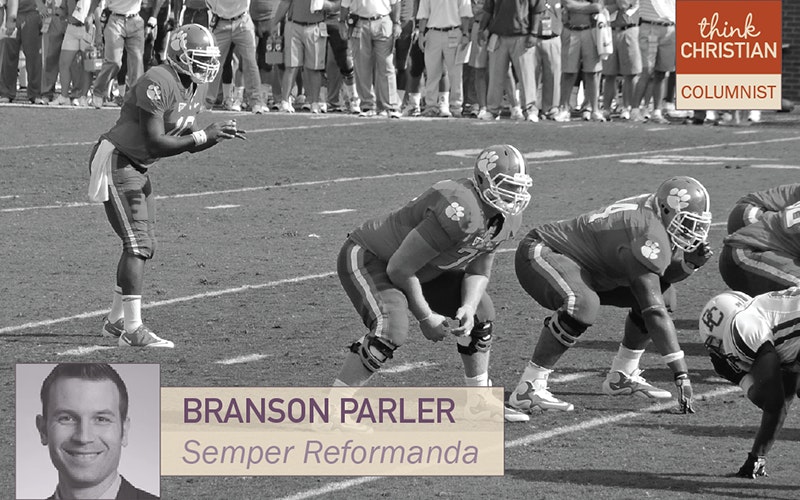
Culture At Large
The continued shame of college sports
Today marks the College Football Playoff National Championship, featuring the Alabama Crimson Tide versus the Clemson Tigers. As an avid sports fan, my thoughts about college sports are mixed. On the one hand, I recognize the good of physical activity, the engaging challenge of competition and the community and identity provided by college sports. On the other hand, many thinkers, including Taylor Branch, have pointed out the exploitative system whereby some student-athletes create enormous amounts of income for universities while being undercompensated for the value of their labor.
College sports should be a matter of concern for Christians who care about economic justice, a basic principle of which is that laborers are worthy of their hire. The college sports industry generates $11 billion a year, and yet there are times when athletes go to bed hungry. One could argue that the athlete is paid through scholarships, but this pay is certainly disproportionate to income produced by the football and basketball players at major schools. It would seem that those who bring in hundreds of millions of dollars have at least some claim on being recompensed fairly and proportionately. As Pope Leo XIII argues, the principal duty of those who control capital and reap benefits from the work of others is to give them what is justly theirs.
But this is about more than economics. It’s also about race, because the male athletes who generate the most revenue for NCAA programs are disproportionately African-American. A recent Washington Post article highlighted the link between racism and opposition to paying college athletes. The featured study showed that “negative racial views about blacks were the single most important predictor of white opposition to paying college athletes.” This link between racism and college sports is not new; others have compared the NCAA and its institutions to plantations, slave owners and Jim Crow. As Brando Starkey points out, both Jim Crow laws and NCAA regulations aim at limiting the property rights of African-Americans. Under Jim Crow laws, Southern black Americans could raise cotton but couldn’t sell it to anyone but the landlord; under NCAA regulations, student-athletes cannot sell their own signature and do not even have property rights over their own image. So Ahmed Taha notes that while college athletes taken as a whole group are not exploited, there is a troubling racial component: male basketball and football players, who are disproportionately black, subsidize all other college sports, in which only 8 percent of male scholarship athletes are black. David Wiggins puts it this way: “African American college athletes of today are often more athlete-students than student-athletes, kept eligible for as long as possible by millionaire coaches who have been hired to win games for schools striving for national acclaim.” And, of course, for the money that comes with it.
College sports should be a matter of concern for Christians who care about economic justice.
One common objection to paying student-athletes is that college sports are about amateurism — love of the game and love of school. As Ekow Yankah notes, the discipline and learning that happen in sports are part of the value of a holistic education. I agree. But is treating sports as a full-time job really a balanced, holistic education? Doesn’t it clearly place disproportionate emphasis on athletics? Furthermore, if amateurism is so important for athletes, why not for coaches? Marc Edelman points out that “the highest paid public employee in 40 of the 50 states is the state university’s head football or basketball coach.” Clearly, college sports are “nonprofit” only for those who are not profiting from them, namely, the athletes.
What can the average Christian sports fan do? First, simply being aware and thoughtful about this complex matter is important. Sports are subject to the same sin and distortion as the rest of human life. Our participation as fans cannot be unthinking and unaware of the way systemic injustice can plague athletics. Second, because of the value our culture places on sports, student-athletes, especially Christian ones, need to recognize the real power they have and seek to use that power for the sake of economic and racial justice. Although athlete efforts to unionize have been met with resistance, the University of Missouri football team realized just how powerful they were when the school’s president was forced to resign because of their threatened boycott of just one game. These kinds of associations, notes Leo XIII again, are a natural right when they are aimed at proper distributive justice, and remind us that the power of solidarity is powerful indeed.
The business of college sports is admittedly complex. But that’s all the more reason for Christians to engage it thoughtfully and carefully. So go ahead and watch Alabama and Clemson tonight — I will — but have more on your mind than just who’s going to win the game.
(Thanks to Denver Parler for directing me to key sources and a good conversation on this topic.)
Topics: Culture At Large, Arts & Leisure, Sports, News & Politics, Justice